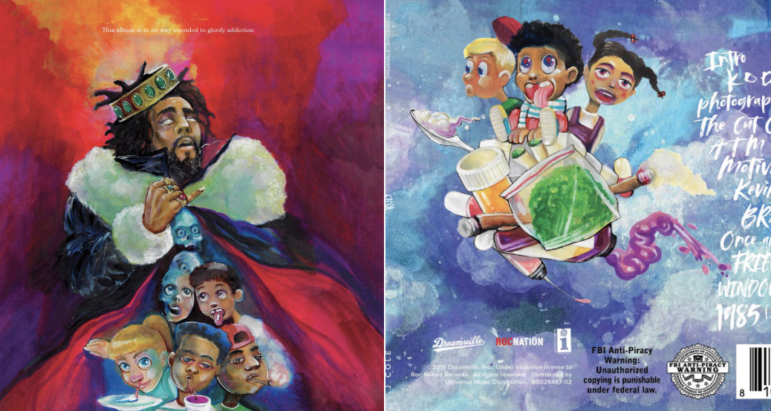
Hip-hop artist J. Cole released his fifth studio album, “KOD,” which stands for “King Overdose” or “Kids on Drugs.” Like its title, its songs are cyclical and packed with double-meaning.
Many have critiqued KOD for being monotonous and unimaginative, but its simple beats and varied rhyme schemes are reflective of hip-hop’s new era of music — “New School” — whose most influential artists include Kendrick Lamar, Earl Sweatshirt and Chance the Rapper.
Much like his recent albums, “4 Your Eyez Only” and “2014 Forest Hills Drive,” Cole’s music is introspective and deals with delicate, personal experiences: everything from boyhood to drug addiction.
“KOD” in particular centers around one theme: choice.

The album begins with a story of birth: “A newborn baby has two primary modes of communication/ Laughter, which says, ‘I love this’/ Or crying … There are many ways to deal with this pain/ Choose wisely.”
Each song presents a choice that J. Cole has made in his life, a choice that he struggles with every day. “KOD,” the second song on the album, talks about drug addiction. Other songs such as “Photograph” and “Window Pain” tackle his complicated relationship with religion and his disillusionment with fame and wealth.
These songs, and the album as a whole, reveal his knack for wordplay — as evident by clever titles like “Window Pain” and “Kevin’s Heart.” The album heavily criticizes gang violence, addiction, materialism and infidelity, and each song stays with the theme to emphasize the power of choice.
Though the album’s title, “KOD,” implies drug addiction, the album analyzes the many facets of addiction and its complexities. In his song “ATM,” with it’s haunting and purposefully catchy chorus “Count it up, count it up, count it up, count it,” Cole examines addiction to wealth and materialism. ATM’s self-directed music video features a group of people with dollar signs as eyes chasing a single, unattainable dollar bill flying through the sky. Similarly, in “Kevin’s Heart,” a song that comments on comedian Kevin Hart’s very public affair, Cole describes his personal struggle with temptation and infidelity: “My phone be blowing up, temptations on my line … If I take this cookie now one day I’ll do the time.”
Though the album acknowledges J. Cole’s own flaws like his previous addictions to wealth and drugs and his desire to retaliate with violence and his temptation to cheat on his partner, many have criticized his lyrics as condescending and patronizing.

This criticism can be traced to the final song on the album, “1985 – Intro to ‘The Fall Off,’” where Cole allegedly calls out 17-year-old rapper (known for promoting recreational Xanax) Lil’ Pump.
“1985” — the year of Cole’s birth, which is the opening and conclusion of the album — is a reflection of J. Cole’s premature rise to fame and his regrets. The song starts off mellow and gentle, a much older and wiser J. Cole bestowing advice to young rappers who he feels could learn from his mistakes as a successful youth when he only cared about partying and money. Later in the song, however, his “advice” comes off as disdainful and patronizing.
He first criticizes “young generation” artists such as Lil’ Pump for upholding the stereotype that white people already see them as — “These white kids love that you don’t give a f*ck/ ‘Cause that’s exactly what’s expected when your skin black” — and expresses his distaste for their materialistic lifestyles and encouragement of drug addiction. Again, Cole reiterates the importance of choice: that they can choose to use their platform, become a better version of themselves, and reject their predestined life of addiction, or they can choose to “fall off,” as the title of the name cautions.
“KOD” comes full circle. It opens with a newborn baby presented with a choice — to choose between laughter and sadness — and then ends with its main character, Cole, thriving in spite of the struggles he faced and the mistakes he’s made.
Though not nearly as melodic and catchy as his past albums, “KOD” is an ambitious, politically-charged autobiography that tackles personal and universal struggles in a way similar to Kendrick Lamar’s storytelling on his highly-acclaimed album “DAMN.”
Since its release, “KOD” has become a source for memes and ridicule — most posts involve a incredibly simplistic lyric with an image of a J. Cole fan’s mind being blown. J. Cole is certainly not a Pulitzer Prize-winner: but his uncomplicated lyrics and unembellished beats are part of what makes his music distinct and unique and separates him from other artists. The main criticisms of “KOD” are also its main strengths: it’s simple beats and subdued melodies highlight the complex, clever verses, and its condescending and sometimes hypocritical messages further prove J. Cole’s humanity.
Contemplative, honest and fresh, “KOD” is reflective of J. Cole’s growth both as an artist and as a person.





